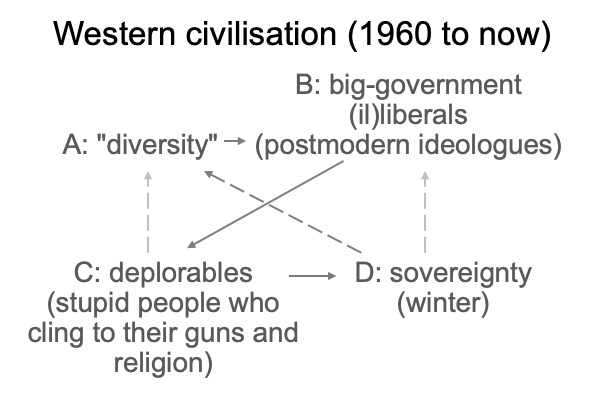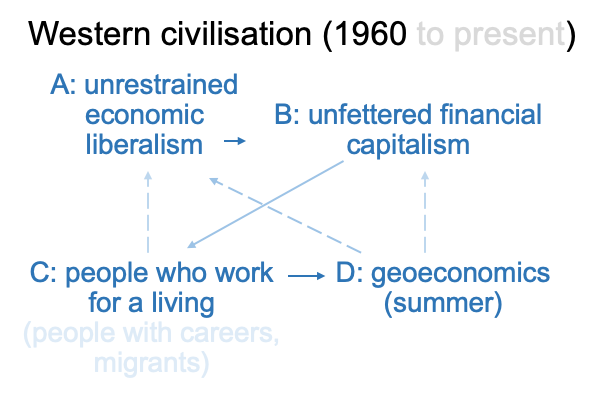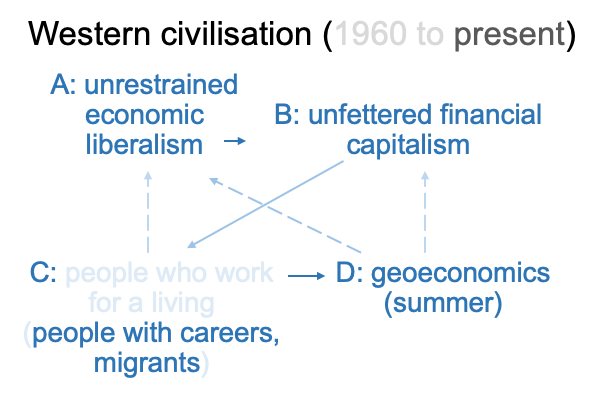0131 Perhaps, this is a good place to plug Comments On Daniel Estulin’s Book (2021) “2045 Global Projects At War”,available at smashwords and other e-book venues. Just as Diesen constructs a theoretical apparatus (which here, turns into a Greimas square), Estulin looks at current affairs through the prism of global projects (which, in the comments, turn into interscopes). A comparison of Diesen’s and Estulin’s books (with this examination and the plugged commentary in mind) would serve as a great senior-level college project.
0132 I offer this plug as a distraction to what comes next.
There seems to be a paradox.
How can the season for political liberalism be winter and the season for economic liberalism be summer?
0133 Winter for the grand idea (in the former case, sovereignty, D) occurs when the manifestation (pluralism, A) no longer constrains the destruction unleashed by gesellschaft (bigilibism, B) upon gemeinschaft (traditionalists labeled as deplorable throwbacks to a bygone era, C). Balance between gesellschaft (B) and gemeinschaft (C) is win-lose or lose-win or lose-lose.

0134 Summer for a grand idea (in the latter case, geoeconomics, D) occurs when the manifestation (unrestrained economic liberalism, A) productively yokes gesellschaft (unfettered financial capitalism, B) and gemeinschaft (people who work for a living, C). Balance between gesellschaft (B) and gemeinschaft (C) is win-win.

0135 To me, it seems that these two figures are at odds.
Yet, Diesen’s concept of seasons provides a clue to a resolution.
The win-win of unfettered financial capitalism includes, at first, people who work for a living. By the time that autumn approaches, a significant fraction of the West’s capital resides in the hands of a small number of elites. At first, people who work earn enough to own an automobile and a house. By the end of the season, people who work take out loans in order to “own” an automobile and a house. People who work live in a debt trap.
The economic story of the West is complicated. Here is one version of the story, in a nutshell.
The continual enlargement of central governments (in Tokyo, Washington D.C. and Brussels) requires more spending than tax receipts, so these central authorities need to borrow money. Central banks cooperate by keeping the interest rate artificially low, which allows governments to pay less interest for their borrowing. It also puts more money into circulation.
On top of that, artificially low interest rates encourage financial players to borrow money at low cost to compete with worker’s savings. Government-blessed money printing, plus ruthless competition by speculators, drives up the prices of necessities, so workers must borrow money, at high “market-based” interest rates, in order to achieve what savings once achieved.
After fifty years of financial repression, bigilib elites privately own significant assets. People with careers in corporations that borrow at artificially low interest rates have high salaries. Corporate owners lobby for opening borders to desperately poor migrants in order to (1) not pay the salaries that deplorables need and (2) turn the migrants into debt slaves.
0136 So, at the end of the summer of geoeconomics, Diesen’s square looks like this.

0137 People with careers (that is, people working in protected markets such as law, medicine, state education and so forth) and migrants (who, presumably will join the deplorables in the debt trap after a generation or two) are the gemeinschaft that is cultivated by a gesellschaft of unfettered financial capitalists, along with their political, academic, and media shills.
I suppose that the plan is to use propaganda to turn the deplorables against the migrants in order to maintain both parties in the debt trap of financial capitalism.
0138 Unfortunately, I suspect that both the deplorables and the migrants will figure out the nefarious plan, as the autumn of geoeconomics begins.
The only people who remain clueless at the end of the summer of geoeconomics are the people with careers, requiring certification, who feel that their jobs are protected because of restrictions to market entry.
